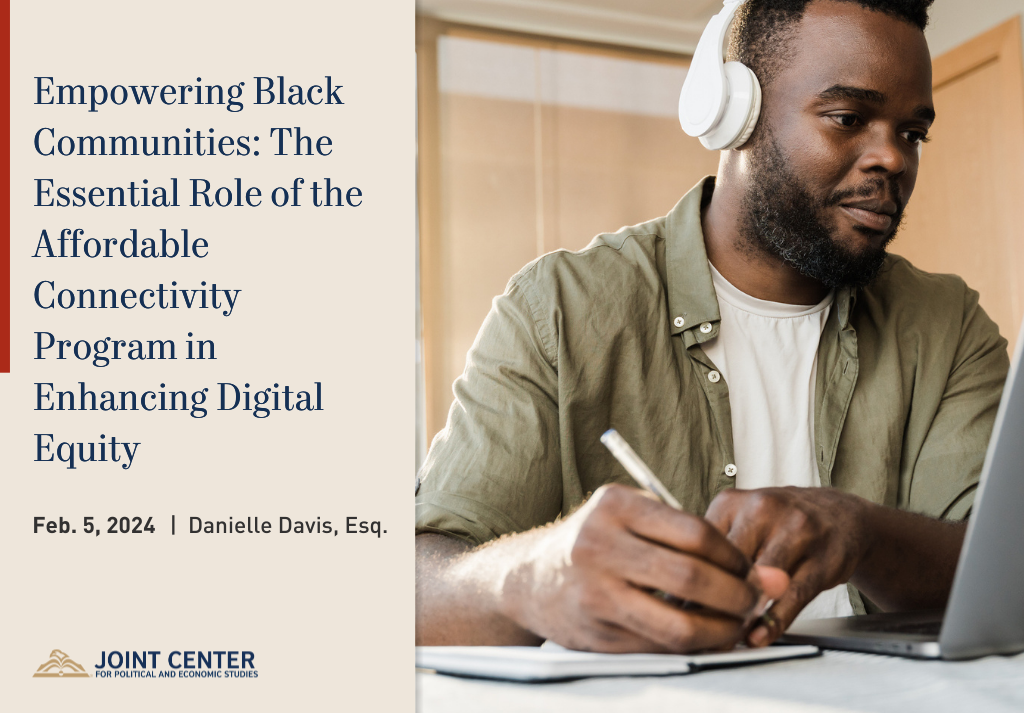Tech Policy

Empowering Black Communities: The Essential Role of the Affordable Connectivity Program in Enhancing Digital Equity
In our increasingly connected world, dependable and reasonably priced internet access is an essential lifeline. However, on Feb. 7, the Federal Communications Commission (FCC) will end enrollments for the Affordable Connectivity Program (ACP), a broadband affordability program benefitting over 20 million households. Soon after, in April 2024, the FCC expects the program to run out of funding and end support for enrolled households.
The ACP, funded through the bipartisan Infrastructure Investments and Jobs Act, aims to increase broadband affordability by providing eligible households with discounts on internet services and devices. The ACP is an FCC benefit program that provides eligible households with up to $30/month off internet service (up to $75 for households on tribal lands) and a one-time discount of up to $100 to purchase a laptop, desktop, or tablet from a participating provider.
This program is especially beneficial in Black communities, where the need for affordable connectivity is high. Joint Center analysis found that from 2015-2019, about one in five Black students lacked home broadband access. Therefore, by reducing the financial burden of internet access, the ACP promotes digital inclusion and increases access to online education, telemedicine, and remote work.
The ACP has the potential to benefit Black households who need affordable internet access the most. Eligibility for the program is limited to those earning at or below 200 percent of the poverty line ($60,000 for a family of four in 2023) or those eligible for certain social assistance programs such as the Supplemental Nutrition Assistance Program, Special Supplemental Nutrition Program for Women, Infants, and Children, Federal Public Housing Assistance, Supplemental Security Income, Medicaid, Veterans Pension and Survivors Benefit, Free and Reduced-Price School Lunch, or Federal Pell Grant recipients in the current award year. Nearly 38.5 percent of Black Americans lived below 200 percent of the poverty line in 2022, making them eligible for the support that the ACP offers.
Currently, ACP faces a potential shutdown in April 2024 due to a lack of funding. Bipartisan congressional leaders, including Reps. Yvette Clarke (D-NY) and Brian Fitzpatrick (R-PA), along with Senators Peter Welch (D-VT), JD Vance (R-OH), Jacky Rosen (D-NV), and Kevin Cramer (R-ND), introduced the Affordable Connectivity Program Extension Act (H.R. 6929/S. 3565) seeking $7 billion dollars to fund the program through the end of 2024.
Alan Davidson, National Telecommunications and Information Administration administrator, has warned that ending the ACP could compromise the Broadband, Equity, Access, and Deployment (BEAD) program’s success. The BEAD program is a federal grant program that supports the expansion of internet access nationwide by financing the construction of necessary infrastructure and promoting the widespread adoption of high-speed internet through partnerships among states, communities, and key stakeholders.
The ACP plays a key role in ensuring BEAD’s success, making sure that affordable broadband extends to the broadest possible user base, which includes those with limited financial resources.
FCC Commissioner Geoffrey Starks, a steadfast advocate for digital equity, has expressed urgency in this matter and has gone on record stating “continuing the program would ensure that [millions of] households are not left behind and that we continue to make progress in connecting every last American to high-speed internet. Importantly, it also would strengthen rural deployment efforts through programs like the BEAD by reducing the subsidy needed to reach unserved and underserved locations.”
As we move forward, it’s essential to continue supporting and enhancing initiatives like the ACP to ensure that no one is left behind in our increasingly connected world. The ACP makes broadband access more economically feasible, fostering greater participation in the digital economy and contributing to the overall economic development of Black communities. Further, the ACP subsidy ensures that the infrastructure developed through the BEAD program can be used to its fullest potential.

